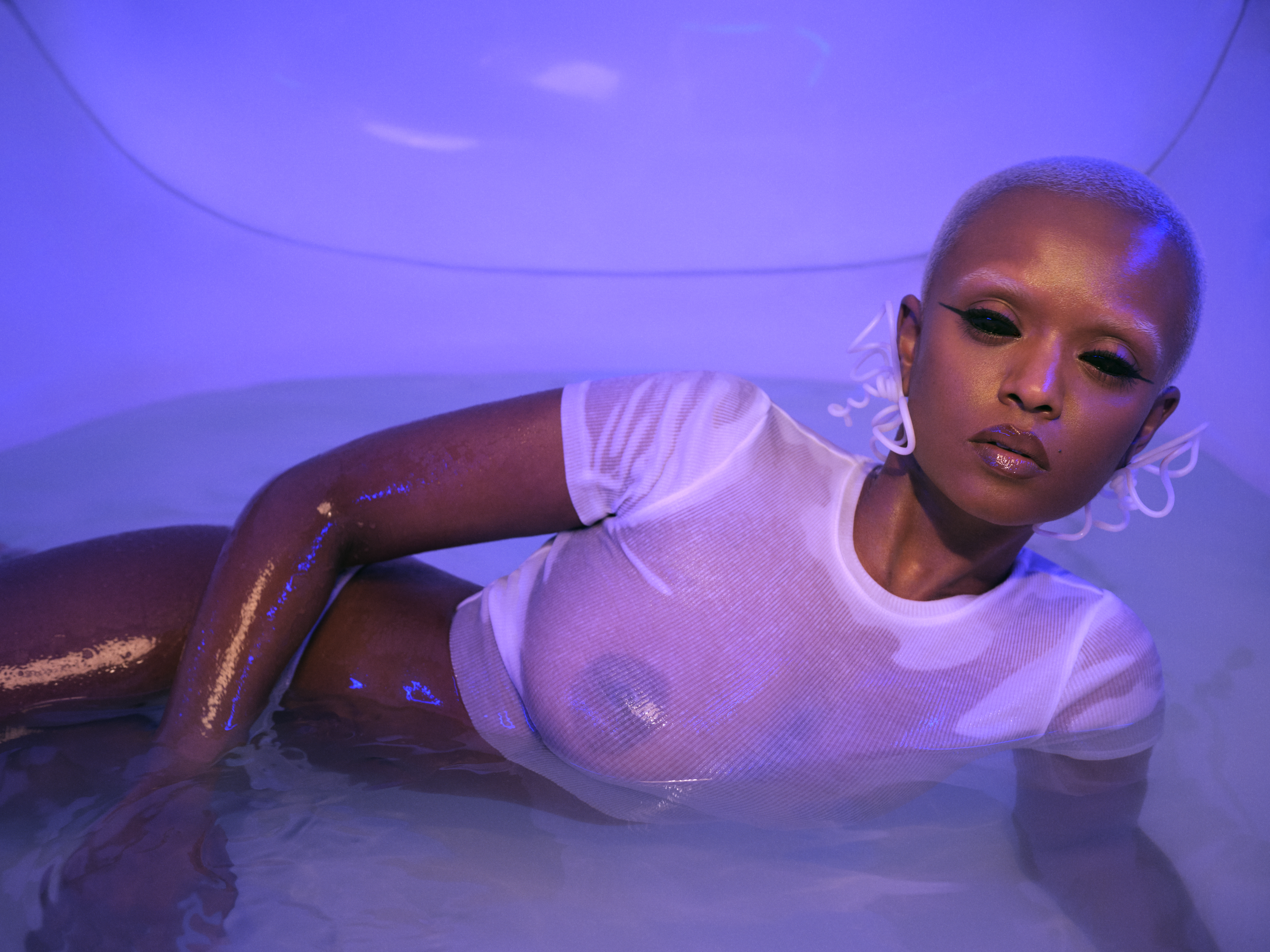flavors
Kelela and Bambii on the Power of the Remix
Playing the same version of a song forever is one of Kelela’s worst nightmares. The beloved singer-songwriter has been making disarming, chopped-up R&B for years, but when she dropped her first official remix album to the 2017 project Take Me Apart, it was like all the pieces of her sonic journey had been tied together. Now, the Maryland-raised singer has flipped her latest album Raven with RAVE:N, the Remixes, laying her angelic vocals over rearrangements by underground legends and friends like LEECH, NGUZUNGUZU, and LSDXOXO. “I’m so freed by the idea that this will have many lives,” she says of her musical process when she’s joined by producer and “On the Run” video vixen Bambii to talk about her musically rich upbringing, rejecting institutions, and remixing as a Black American tradition. She’s creating a kind of futurist fantasy: “When you’re experiencing erasure, you don’t have a choice but to world-build.”
———
KELELA: Where should we start?
BAMBII: Let’s talk about the come-up, the origin story. We are both only children.
KELELA: Yeah, so much of my come-from as an artist has been influenced by the amount of time I’ve spent—
BAMBII: Alone. [Laughs]
KELELA: There’s just a certain relationship you develop with yourself when you are spending that much time alone. And it can also feed into a couple of very specific ways of interacting with other people. There’s also the compartmentalization and the way I’ve always had many different lives happening at the same time. My home life was very separate from my school experience, being second-generation Ethiopian. There’s music I would listen to with certain people and another thing I’d obsess over with others, and a lot of that was racialized.
BAMBII: You can’t bring one thing into the other thing.
KELELA: It’s like something bad would happen if they collided. I think it’s also affected how I listen. I am a fixator.
BAMBII: Being an only child definitely makes you listen to music in a way that others are not. You’re hyper-listening. I would always run things back a million times because I never had to share with anyone. [Laughs]
KELELA: Literally what happened when I had a 3 CD changer in high school. I didn’t have to explain my taste to anybody.
BAMBII: Exactly.
KELELA: Nobody’s shaming me for wanting to experiment with something. I’m such a sponge, and I’m so easily influenced by my surroundings, and the confusion of your adolescence just makes you make really weird decisions. And again, it was very racialized. There was Black music, there was white music, and—
BAMBII: It ties you to a particular identity. You have to be sure you want to be that thing. It was so damning. You’re white because you want to listen to a little rock. The stakes were very high.
KELELA: And I dealt with that by not being too committed to any group. I was a lunch table hopper.
BAMBII: Yeah.
KELELA: There was this game called “ice cream honeys” at that time, and I remember I was so on the periphery that they gave me a made-up flavor that was kind of a pity name. I used to wear my hair in a bun, and I would use a wave brush with hella brown gel to brush my hair until the waves just popped the fuck out. So they came up with the name Chocolate Chip Cookie Ripple.
BAMBII: What were the other names?
KELELA: Chocolate Chip, Strawberry Shortcake, you know what I’m saying? Real flavors. [Laughs] High school was when I discovered Incubus, specifically Morning View, and Pink Floyd’s Dark Side of the Moon, and it was an at-home experience. I was in 11th grade when Napster was first invented, which was the first time we ever got music online, and it was like a miracle. We couldn’t believe that you could get anything, and sometimes the files would be all corrupted. Other times, you’re getting some bootleg remix. That’s how I discovered Garage music. That’s how I discovered Artful Dodger and Craig David. If you’re in the UK, you’re living in another world.
BAMBII: You might as well be in another dimension.
KELELA: Yeah, this is the first time that I was making contact with it. It’s still underground music at that time, and I remember losing my shit in my room by myself and not having anyone to share that experience with. So while it was really isolating, it was also very liberating and led to so much discovery. What was it like for you?
BAMBII: I think I had a similar feeling that I’m listening to things that my peers are not listening to, and never having to answer to anybody. But I always had this feeling of, “I can’t wait to leave.” I couldn’t wait to leave high school. I couldn’t wait to get to downtown Toronto where I felt like everything was happening. Where I lived just felt small. I always felt that there’s something else to be uncovered.
KELELA: Yeah, that’s relatable. I started going to the club at 16, so my experience felt just so wildly different from my peers. I was so connected to the city because I was there every weekend with my family. This part of my adult life where I’m able to express myself through music is a very triumphant moment because I’m able to connect many different parts of myself that used to be really compartmentalized. My hip hop and R&B self, my jazz self, my dance music self, my four-four self, all feel like they coexist. That’s the platform that these remixes allow me, and that’s how I’ve used this project. The layers of meaning make it feel like a really rich text, and you’ve been such an incredible part of the whole Raven journey. You produced on the original album, but the people should know that you also submitted two or three different remixes. I’m curious what you think about the remix project and remix culture in general.
BAMBII: I mean, as someone whose intro into music was DJing, I’ve obviously been on SoundCloud for forever. Remix culture has been mostly unacknowledged. It had a presence in mainstream music a bit in the early 2000s, but it dropped off and became this illegitimate machine that was actually really driving pop music and helping to recontextualize it for communities that weren’t really represented in pop music. And I feel you’re one of the only artists with visibility reclaiming it and legitimizing it as a revolutionary way of listening and a valid art form.
KELELA: Thank you. I appreciate that.
BAMBII: The reason why a lot of songs remain iconic for so long is because they’re living through the remix past its period of circulation on the charts.
KELELA: Period.
BAMBII: So watching you do this project, and not only putting on all these underground artists that we love, but putting it out as a formal piece of work says a lot about the infinite nature of music production and where a sound can go. There’s something so limiting about putting out a song and that’s it for the song.
KELELA: That’s a nightmare for me. Playing the same version of a song forever until I die?
BAMBII: Forever.
KELELA: Part of that has to do with my jazz background. I’m definitely not a jazz singer, but I have appreciated and sung jazz for a lot of my life, and the practice of flipping standards is inherent in what you do as a jazz musician. Then when I made contact with this community of DJs and producers that I’m immersed in right now, their practice of flipping and reinterpreting felt really parallel. It’s a beautiful thing because they’re both very Black practices, so it’s interesting to feel them collide inside me and work so nicely together.
BAMBII: It’s a continuation of the sonic narrative. You’re going on a journey.
KELELA: I’m going on a journey. That’s another part of what I love about remixing is my ability to access a new feeling. A perfect example of that is the last track on Take Me a_Part, the Remixes and the last track on RAVE:N, the Remixes. I love creating a completely different arrangement that makes you think about the same theme in a different way. There’s something to be said about making pop music figures another type of iconic and re-inserting them into the conversation over and over again. A lot of singers feel quite removed from that experience of listening, but I’m in the club hearing these edits and remixes and it makes me feel really infinite. I feel like I’m in a constant conversation. Take Me a_Part, the Remixes was the first time that I took the project by the reins in this way that I’ve always envisioned. I just love music.
BAMBII: You said something about not locking yourself to a specific sonic aesthetic. I think people like to build these borders around music, and what’s so great about the remix project is that there’s so many different ways to hear this music. You can’t simplify it. You can’t lock it to a context. It’s such a shame that people with visibility aren’t understanding the different things that their music could be, or not acknowledging that their songs are literally becoming anthems at grunge raves. It’s crazy.
KELELA: Yeah. When I’m constructing an original album, I’m so freed by the idea that this will have many different lives. I’m just coming up with the original tapestry. And the expectation of that is just so exhilarating.
BAMBII: Well, next on the docket, it would not be a conversation if we did not talk about male fragility. [Laughs]
KELELA: Yeah, it feels built in for women who produce and write and are artists. The default setting of male tyranny and fragility in music making is… it feels like your dreams are coming true while also you’re taking a beating.
BAMBII: Yes.
KELELA: And it’s something that a lot of people don’t ever liberate themselves from. A lot of women and femmes are not able to access the autonomy that they deserve. It’s important to name that and the ways that it shows up.
BAMBII: I think the biggest one is self-belief. Women discredit their own ideas much more than men do.
KELELA: The doubt producing speech and behavior really seeps in. The men are gone and still you’re questioning yourself in the same way that they did.
BAMBII: It’s very insidious, actually.
KELELA: I’m so happy that I’m the boss of my music and business so you don’t experience that while working on a project of mine. My trajectory did not start that way, but over time, I’ve been able to wield my own spaces and uplift the people that need to be uplifted.
BAMBII: You set the context for me to believe in myself, so I am proof of that. Being part of your work is a living, breathing validation, and I thank you for that.
KELELA: I believe in you so much. I came into this without experiencing any of that safety, so I’m so determined to make sure of that, especially for dark-skinned femmes.
BAMBII: Yeah.
KELELA: The colorism element will always compound any issue and any self-doubt. It’s political but it’s also personal. You are extremely brilliant, but I know what it’s like to be swimming in that self-doubt. It’s very important that sometimes people are like, “You’re ready.” I’m happy we could do this together. I love you.
BAMBII: I love you too. We’ve talked about being anti-aspirational, and I wanted to ask you how you recontextualize dreams and success for yourself as an artist?
KELELA: I’m often asked about my dream collaborations in interviews and I admire so many people who I would love to collaborate with, but it’s not something that I’m centering. I’m more obsessed with world building. I want to make a world for people who have always felt outside of what is mainstream or easily understood. I do aspire, but not towards a big trajectory of more visibility.
BAMBII: It’s not so externally informed. I think when people answer that question, they start to call upon institutional accolades and say people that have way more visibility than them. What I’m hearing is that your aspirations are much more independent. They exist outside of all these institutions.
KELELA: Yeah, yeah.
BAMBII: And being a dark-skinned femme, you also have no choice but to do that.
KELELA: Say that. I agree.
BAMBII: We’re not even considered in these systems in the first place, so you have to reimagine success, reimagine aspiration.
KELELA: You’re so right. When you’re experiencing erasure, you don’t have a choice but to world-build.
BAMBII: Exactly.
KELELA: Wow, you really tore that. I’ve never said that out loud or heard anybody articulate that, and I feel stunned by that.
BAMBII: Thank you.
KELELA: It’s important for people to connect that dot. There’s a way that I am shut out—not that there’s a campaign against Kelela, but these systems of colorism and misogynoir and capitalism are intersecting in a way that creates very few options, and it’s better to create your own option. I’m in such a place of privilege right now to be able to do that in a way I was not able to before. I feel honored.
BAMBII: Definitely. And alongside the communities you build is the humor, the discourse, the tweets.
KELELA: It’s so layered. Sometimes it’s really academic, but also a read, like a street read.
BAMBII: I think we should read out some funny tweets here because they’re a ki.
KELELA: Oh, let’s start with the one that you shared earlier. We did the On The Run video together and in the video, we’re in a car.
BAMBII: We’re being chased by someone and we’re driving away, and someone said, “If Kelela and Bambii could run me over with their car, it would be highly appreciated.” [Laughs] I feel if your community mothers you, like you’re mother, you are also the dom. You are the top, always.
KELELA: That’s a big part of the Kelela brand, topping from the bottom. I would say that that’s what it gives. There was one the other day that said, “I can’t wait until I can blast this Kelela RAVE:N, the Remixes album and wake up my kids so we can clean.” That is real.
BAMBII: Right.
KELELA: There’s another one I like. I would say the queen of what it is that I’m trying to do through the remixes is Mariah. She invented rewriting and making another version that speaks to the same idea. I think about Static Major too when working on remixes. But someone tweeted, “The way that Kelela should give a masterclass about how to make remixes because some of y’all’s faves need it bad,” and the reply was, “She’s def going in Mariah’s footsteps and now her remixes are another level of slayage.” And wow, the way that that touched me. I feel so heard and received and understood. I feel my messaging lands so clearly because of queerness and Black culture and there’s a razor sharp eye and ear in that.
BAMBII: Totally.
KELELA: This one’s kind of long, it’s not funny, but it’s really beautiful, “An obsession with white hegemony is what keeps Black artists from embracing the skill, originality and variety of Black music across the globe. That’s why my favorite artists are multidisciplinary students of Black history and pull from the Black musical archive. You may not interpret Kelela’s Raven as political or Meshell Ndegeocello’s The Omnichord Real Book as commentary on the very Black experience that has been impacted by slavery’s history, but if you pay attention, all the references are there.” And somebody else responded with, “I read your tweet and the first person I thought of was Kelela. Seriously, you can tell this woman loves black people.” And I feel like we can leave it there because that is what this project is about. It’s about uplifting this practice that is very Black American specifically. It’s important to highlight who it comes from. It’s not my ancestors, but there is just so much wisdom in that practice.
BAMBII: I feel like you are documenting culture as it’s happening. The culture that’s really so unseen, I don’t think anyone else is doing that right now. That’s why you’re so important to us.
KELELA: Thank you so much. I love you.






